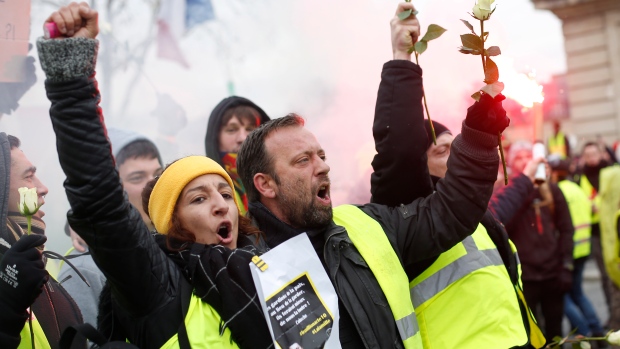
PARMITA DAS – MARCH 6TH, 2019
Political protests are an exercise in democratic rights with which individuals or groups attempt to address perceived injustices within a political system. Since 2016, 1 in 5 Americans have attended a political protest or rally, according to a poll conducted by the Washington Post.
Protests serve an important role in the democratic process by facilitating discourse and deliberation; they drive political reform by signaling people’s disapproval of policies, legislation, and other government actions. For example, the Women’s March champions equitable distribution of opportunities and the empowerment of women, both of which are vital to the continued growth of the economy. The protest rejects economic policies and legislation that do not adequately prioritize women and economic frameworks that discount their contributions. As a result of the political mobilization spurred by the protest movement, a record number of women have been elected to the 116th US Congress. “We are living through the golden age of protest,” said LA Kauffman, a grassroots organizer. The increase in the frequency and scale of protests is unique to the 21st Century, as it denotes a structural shift in how citizens confront authority and how society organizes in addressing its concerns.
Economic Analysis of Protests
The economic ramifications of this powerful tool were made apparent by France’s recent ‘yellow vest’ movement, which was staged in dissent against French President Emmanuel Macron’s economic reforms. The Finance Minister of France Bruno Le Maire acknowledged that the protest movement will have a severe impact on the French economy. Sales by large national retail chains fell significantly during the protests, translating to billions of Euros in losses. The protests also disrupted supply chains, causing shortages and contributing to a decline in consumer confidence. According to the Bank of France’s business sentiment report, growth of the French economy will be cut in half this quarter, in large part because of the impact of the protests on industrial production and services activity. Some of the most impacted sectors will not recover lost business.
The economic costs of protests are often overlooked. Protests can decrease property values and debilitate local and national economic activity. The cost of property damage from rioting is borne across the board—by the government, insurers, and the public. Businesses have a clear disincentive to establish operations in riot-prone areas, as they want to avoid risking their capital. Protests, therefore, can influence regional and national employment rates. They significantly increase costs for firms, as they cause a statistically significant reduction in firm productivity. According to the paper “Economic Impact of Political Protests (Strikes) on Manufacturing Firms: Evidence from Bangladesh” by the Institute of Developing Economies, there is no evidence of systematic factor re-optimization by firms as a response to protests. This suggests that firms are ineffective in reallocating the factors of production to counter the uncertain and irregular shocks in productivity caused by protests.
In addition, protests increase investors’ uncertainty as they serve as markers for political instability. A risk premium is assigned to securities originating from politically unstable countries. After Bahrain’s protests during the Arab Spring, rating agencies Standard and Poor’s and Moody’s both lowered the Bahrain government’s bond and credit ratings—attributing the decision to the region’s political turmoil and civil unrest. Withdrawal of foreign direct investment (FDI) and capital flight, resulting from a fall in business confidence, reduce the economic growth rate of the affected country. The impact on tourism is more complex. Predominantly, tourists are apprehensive about traveling to countries experiencing protests, for fear of being endangered by riots. However, a rise in “riot tourism” or “protest tourism” has been observed whereby activist actively seek out hotspots and travel there for the chance of participating.
Protests in International Relations
On an international scale, protests serve as a signaling mechanism to wealthier countries. The 1989 Tiananmen Square protests resulted in widespread condemnation from the international community and, subsequently, sanctions being placed on China. As protests sometimes accompany a régime change, new governments have to deal with the repercussions of shattered international confidence. This lengthens the post-conflict reconstruction process, as it is difficult to accumulate the capital investment needed to revitalize the economy.
Protests, however, can be used as a negotiating tool. When the people of Greece took to rioting in response to the country’s economic troubles, the Greek government hinted that the protests threatened the stability of the administration. This fueled the European Union’s fear of the decimation of the Euro if the Greek economy failed and led to a generous bailout for Greece. In comparison, Ireland was much calmer and, consequently, received a less attractive bailout package. Therefore, protests can serve a strategic value in international diplomacy and loan dialogues.
Conclusion
Large-scale protests have become more numerous and geographically widespread in recent years. The rise of citizen mobilization spanning diverse national and cultural contexts represents a major new trend in international politics. Protests play an ever increasing role in shaping the political landscape and determining legislative and economic decisions. The Arab Spring protests serve as a crystallizing example of the sheer power of this tool to affect change. It is therefore important to recognize the economic consequences of this tool in order to yield it strategically and effectively.
Featured Image Source: CP24
Disclaimer: The views published in this journal are those of the individual authors or speakers and do not necessarily reflect the position or policy of Berkeley Economic Review staff, the Undergraduate Economics Association, the UC Berkeley Economics Department and faculty, or the University of California, Berkeley in general.



